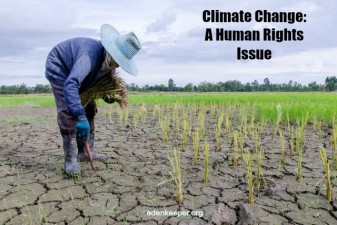Governments are obligated to act on the human rights implications of climate change

By Dr Anthony Horton
A report published by the United Nations Environment Program and the Sabin Centre for Climate Change Law at Columbia Law School has clearly outlined and discussed the obligations of Governments to respond to the human rights implications of climate change. The ‘Climate Change and Human Rights’ report was published in December last year.
While the core international human rights treaties do not recognise a right to a clean environment, it is generally understood that inadequate environmental conditions can diminish the enjoyment of rights to life, health, water and food. The International Covenant on Economic, Social and Cultural Rights (ICESCR) is an example of a treaty that explicitly recognises this link. It directs Governments to adopt necessary measures necessary for the improvement all aspects of environmental and industrial hygiene as part of the right to health. The Convention on the Rights of the Child (CRC) directs Governments to account for the dangers and risks of environmental pollution to ensure the implementation of the right to health for children.
Two key events have been credited with starting the international dialogue on human rights and climate change. The first was a petition submitted to the Inter-American Commission on Human Rights (IACHR) by the Chair of the Inuit Circumpolar Conference in December 2005. The petition requested relief for human rights violations resulting from the impacts of global warming and climate change. It alleged that the United States had violated the Inuit’s human rights by not adopting adequate greenhouse gas (GHG) emission controls. The IACHR did not issue a decision however it drew public attention to the effects of global warming on the Inuit people.
The second event occurred in November 2007 when the Small Island Developing States (SIDS) adopted the Male Declaration on the Human Dimension of Global Climate Change. This declaration was the first to recognise that climate change has clear and immediate implications for the full enjoyment of human rights. The United Nations Human Rights Council (UNHRC) responded to the declaration by issuing a resolution in 2008 expressing concern that climate change poses an immediate and far reaching threat to people and communities around the world, and has implications for the full enjoyment of human rights. The UNHRC also directed the Office of the High Commissioner for Human Rights (OHCHR) to conduct a detailed study of the relationship between climate change and human rights. In their report which was released in 2009, the OHCHR concluded that Governments have a duty to address the effects of climate change on human rights regardless of whether that Government has contributed to climate change in a manner that gives rise to human rights violations. The OHCHR also discussed obligations of international cooperation and asserted that Governments are obligated to address the effects of climate change outside their territory.
Following the OHCHR report, the UNHRC issued five resolutions that recognise the link between climate change and human rights. Although the UNHRC has not yet issued an explicit declaration on the obligations of Governments to respond to the human rights implications of climate change, these obligations do exist. The Human Rights Obligations Relating to the Enjoyment of a Safe, Clean, Healthy and Sustainable Environment report in 2013 discussed a number of statements from United Nations human rights treaties and bodies overseeing them, other United Nations bodies and international environmental instruments that recognised human rights obligations related to climate change.
The obligations of Governments with respect to the human rights implications of climate change are categorised as procedural, substantive and those related to individuals belonging to specific groups. Procedural obligations include ensuring access to information and conducting environmental assessments, public participation in environmental decision making and access to administrative judicial and other remedies. Substantive obligations include adaptation obligations (protecting human rights from climate related harms), domestic mitigation obligations, international cooperation obligations, obligations to address transboundary harm and safeguarding human rights in mitigation and adaptation activities. The obligations related to individuals that belong to specific groups address women, children and indigenous people.
The recommendations of the Climate Change and Human Rights report relate to the following:
- International cooperation
- National measures
- Local Governments and private companies
Climate change and Government responses to it will significantly influence how the human rights of billions of people across the world are exercised. Governments clearly have obligations to respect, protect and fulfill human rights. Protecting human rights includes mitigating domestic GHG emissions, protecting citizens against the harmful effects of climate change and ensuring that responses to climate change do not violate human rights.
 About the author: Anthony Horton holds a PhD in Environmental Science, a Bachelor of Environmental Science with Honours and a Diploma of Carbon Management. He has a track record of delivering customised solutions in Academia, Government, the Mining Industry and Consulting based on the latest wisdom and his scientific background and experience in Climate/Atmospheric Science and Air Quality. Anthony’s work has been published in internationally recognised scientific journals and presented at international and national conferences, and he is currently on the Editorial Board of the Journal Nature Environment and Pollution Technology. Anthony also blogs on his own site, The Climate Change Guy.
About the author: Anthony Horton holds a PhD in Environmental Science, a Bachelor of Environmental Science with Honours and a Diploma of Carbon Management. He has a track record of delivering customised solutions in Academia, Government, the Mining Industry and Consulting based on the latest wisdom and his scientific background and experience in Climate/Atmospheric Science and Air Quality. Anthony’s work has been published in internationally recognised scientific journals and presented at international and national conferences, and he is currently on the Editorial Board of the Journal Nature Environment and Pollution Technology. Anthony also blogs on his own site, The Climate Change Guy.
Like what we do at The AIMN?
You’ll like it even more knowing that your donation will help us to keep up the good fight.
Chuck in a few bucks and see just how far it goes!
Your contribution to help with the running costs of this site will be gratefully accepted.
You can donate through PayPal or credit card via the button below, or donate via bank transfer: BSB: 062500; A/c no: 10495969










1 comment
Login here Register here-
philgorman2014
Return to home pageGlobal Warming and Human Rights
Whilst I fully agree with your article I am not sanguine about any government’s acknowledgement of their human rights obligations, let alone their willingness to comply with UN treaties or resolutions linking them to climate change.
Governments tend to ignore recommendations, resolutions, rulings, and international laws which don’t suit their purposes. The Julian Assange case is a current example. The Second Iraq War and Australia’s treatment of asylum seekers also show that corpocracies pay little attention to human rights, ethics, morality or public opinion. It took a hundred years to enact anti-asbestos laws and almost as long to ban lead as a fuel additive, or the advertising of tobacco products. There have been no successful attempts to reduce the human cost of alcohol or gambling.
Governments simply refuse to effectively regulate influential industries, especially those involved in mining and fossil fuels. They usually rely on well-tried misinformation and mass propaganda campaigns to manipulate public opinion and defeat the public good.
I suspect their response to the effects of climate change on human rights will be business as usual.